
MARIN MAZZIE
After watching Marin Mazzie's thrillingly intense performances in the Pulitzer Prize-winning Next to Normal and the current revised revival of the cult classic Carrie, I had actually forgotten that the stellar singing actress possesses such a warm, infectious laugh that she generously sprinkles throughout her conversation. In the Stafford Arima-directed Carrie, the pop musical based on Stephen King's novel about a young woman with telekinetic powers that is now playing the Lucille Lortel Theatre in Greenwich Village, three-time Tony nominee Mazzie is cast as religious fanatic Margaret White, mother of the insecure, bullied Carrie, who is played by Molly Ranson (Jerusalem, August: Osage County). Mazzie, who tears at the heart with an emotional version of "When There's No One," told me last week that working with relative newcomer Ranson has been one of the great joys of this experience. Mazzie, whose Broadway resume also boasts performances in Ragtime; Kiss Me, Kate; and Passion, says her co-star makes "a true transformation [each night]. It's really so exciting to work with her and share the stage with her." Mazzie also spoke about director Arima and the reworking of the musical, which was penned by Academy Award-winning composer Michael Gore, Academy Award-winning lyricist Dean Pitchford and "Carrie" film screenwriter Lawrence D. Cohen. (Mazzie will also be joined by her husband, fellow Broadway actor Jason Danieley, for Playbill's Broadway on the High Seas 2 cruise. Click here to check it out.)
Question: When and how did you originally get involved with Carrie?
Marin Mazzie: In 2009 I got a phone call… "Would you like to be in a reading of Carrie — a workshop of Carrie the musical?" And, I went, "Carrie?" [Laughs.]… It then became known to me that Stafford was the director, so I asked for the material to be sent to me — the script and the music… I had a conversation with Stafford, so we talked about the piece and what his thoughts were and what he was intending to do with it, and I got very excited and interested, and so I said that I would do it.
| |
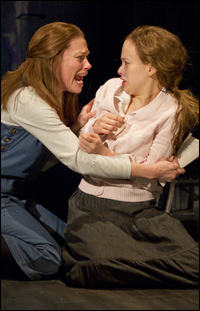 |
|
| Mazzie and Molly Ranson in Carrie. | ||
| photo by Joan Marcus |
Mazzie: …We wanted to give [Margaret] a more human side, and also [there was] the timeliness of what is going on in the world and not only the bullying issue, but the religious right and religious zealotry… Also, Carrie is an abused girl and exploring those elements, but also, wanting the audience to understand Margaret's point-of-view has been my quest and Stafford's quest in creating this… I don't think there's anyone that sits in that audience [who] agrees with what she [does], but they are moved by her, and they have feelings for her, and they understand why she is doing what she is doing, which is because she loves her daughter more than anything, and she believes what she is doing is right. And, I think the challenge of taking this — what's there, what's on the page, what's written —and bringing that to life was a really interesting thing for me.
Question: At that point, were you familiar with the movie or the musical?
Mazzie: No! I had never seen the movie. [Laughs.] I was alive when it came out. I didn't like horror movies. I was scared of them, so I didn't ever go see it. [Laughs.] And, you always see that one clip at the very end, which is, to me, the scariest part of the movie. I have seen the movie now. It's a great movie, and I feel that it's a psycho-drama-thriller [more than a horror film], especially how we look at horror movies today, you know, with "Slasher" — that whole sort of genre. Even when I was a kid, "Dracula" and all of that — I didn't like any of that sort of thing at all. It all scared me. [Laughs.] My brother loved it, and I hated it. So I hadn't ever seen it, but I had seen the '88 production… Quite frankly — and I've said this in a number of interviews — what I have remembered of it are sort of the bad things: the killing of the pig and the weird shower scene. I was a lot younger… I didn't go to the show knowing that it was going to be the iconic flop of all times. [Laughs.] So I just went to the show, and I just remember the bad elements of it for whatever reason… I've never read "Not Since Carrie." I never looked at the video clips online — it never was in my radar, so when they asked me to do it, I didn't really have a great memory… Obviously, I kind of knew what the story was about, but when I really looked at it again and went, "Oh, wow! This is so relevant" and read the novel and looked at the movie and that sort of thing. And, listening to Michael's music and Dean's lyrics and Larry's book, which has changed. All of it's changed so drastically. So that's a long answer to your question! [Laughs.]
| |
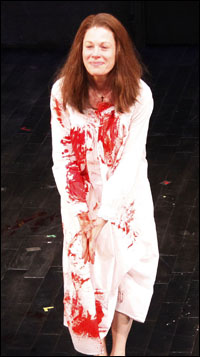 |
|
| Mazzie takes an opening night bow | ||
| Photo by Joseph Marzullo/WENN |
Mazzie: Well, I think one of the things that we didn't do in the 2009 workshop was [set] it in 2009… Now we're in 2012. That didn't happen, and it wasn't really a workshop. It was just a two-week reading. It wasn't like a six-week [workshop], where we worked on it, we staged it… It was a 29-hour reading. It just happened to be over two weeks. They spread out the 29 hours. And, it got a lot of attention because it was Carrie, but it was a 29-hour reading. As anybody who's ever done a 29-hour reading, there's not a lot that can happen in the sense of one just needs to learn the music. They had rewritten some stuff. They had already thrown out numbers. "World According to Chris," which is now in our show, was written for that reading.
And, then, really the development of the piece happened over the next couple of years when Manhattan Class Company and Bernie Telsey came in to produce it, and we did these labs — what we called labs — which were also over two-to-three weeks, where the authors and Stafford and the cast that they assembled for each one got together and worked on chunks of the piece that they thought were problematic, and it was to no end other than to work on these sections. There wasn't a goal to perform them — this was what was so brilliant about it. So there wasn't a pressure in a sense of, "We've got to get the whole thing together, and we're going to perform it for the masses in two weeks time." No. Manhattan Class Company was already onboard — was already going to produce it. They gave us this wonderful luxury of exploring these things with not a lot of pressure — just to explore them and just to make them better. And, by that time, also, the amazing music team of Mary-Mitchell Campbell, AnnMarie Milazzo, Doug Besterman had been assembled. Doug, the orchestrator, [came on board] later. It was Mary-Mitchell and AnnMarie who worked on the sound… One of the things that everyone's talked about was how the two worlds—the Margaret/Carrie world and the Carrie/kid world—did not meld as a score [in the original production]… AnnMarie and Mary-Mitchell [brought] the sound up to contemporary, to now… This sort of incredible team effort went on during these labs. And, that [enabled us] to go into rehearsal in December with a lot of things already informing us, and one of those things was that we were going to do it in whatever year we were going to end up being in. The kids were going to have phones… It doesn't really change that much of anything.... To me, it just makes the world even more insular for Carrie. It just shows that she is so much more of an outsider because she doesn't have a phone, she doesn't have a computer. She doesn't have anything. We don't even have a TV. We have a radio in our house. She is so isolated by her mother in the sense of [her] world, but she goes to school, and she observes girls — the girls and the boys — sees all these things.
| |
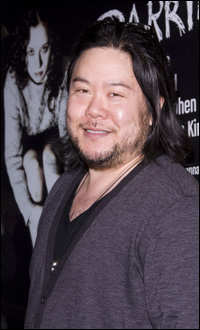 |
|
| Stafford Arima | ||
| photo by Joseph Marzullo/WENN |
Mazzie: I can't say enough. I love him so much. He really is the reason — I'm sure you've read this or heard this or know this — he's the one who got Michael and Larry and Dean to come back to the table. Over the years, people have wanted to do Carrie, and they have not wanted to come back and touch it. Stafford got in touch with them, I think, in 2008. Stafford had seen the original production, actually. He was in high school. His mother brought him to see it, and he has a great memory of it. It came back into his radar when he was thinking about different things, and it sort of popped into his head, and I think he kind of looked at it and thought, "Hmm. This is something I'm really drawn to." Stafford has said to all of us, "Everyone at one time in their life is a Carrie. Everyone feels like an outsider, no matter who you are," and I think we see that in our show — the very first number "In." You've got Chris out there, the bad girl that sort of runs everything, she's out there going, "Will I fit in?" Every kid feels that way, no matter how cliquey — the in-clique or the out-clique or whatever. Everyone has insecurities in their life and, especially, at that time of their life, I think… Kids, obviously, are so relating to it now, but adults are also coming and relating to it in big ways, going, "Oh, my God. I remember the bully in high school. I remember that. I remember feeling terrible." Everybody does.
Anyway, I had worked with Stafford on Ragtime because he was Frank Galati's associate, and so I have known him for a very, very long time, and we're friends. I had just really, really wanted to work with him, and then, of course, when we started sitting down and talking about the piece and what his ideas were and my ideas were, I just got really excited about it, and I can't say enough about [him]. He's a director that has absolutely no ego. He's about the piece and about the work, and he creates the most free environment, so when you go into a rehearsal room with him, you are extraordinarily safe, which, for an actor, is the way you want to work. And, you're able to say or do anything, and he's there to listen. Everyone in this company had so much input into what is now on that stage, but all filtered through Stafford's vision. And so, like I said, I can't really say enough about him — just loved, loved the experience so, so much.
| |
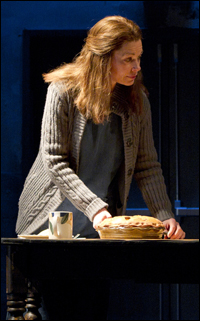 |
|
| Mazzie in Carrie. | ||
| Photo by Joan Marcus |
Mazzie: Margaret is an extremely passionate woman. She's a very complicated woman, as most women are. [Laughs.] … In her past and how it has affected her and brings her to the point of where she is in her life with her daughter, what her deep religious beliefs are and how rooted they are in her being and in her core, and how that affects every decision that she makes. She loves her daughter more than anything, and she's a mother. She's trying to protect her child, which, I think, is just the natural mother instinct, and she's trying to protect her from what she views as evil, and she thinks she's doing the right thing.
Question: I love the mother/daughter section of the score so much. The two women who played Margaret before you, Barbara Cook and Betty Buckley, are so different vocally. I wonder how you decided to approach the score. What were the challenges for you and what were your thoughts about working on those songs?
Mazzie: I love [the songs]!… I heard some material when they did [an early] reading. I've heard Betty sing some stuff, and I think Maureen McGovern did a reading. I have never heard Barbara sing any of it, but whenever I look at a score, I approach it for who I am and what's going to fit into my voice. We changed keys, and we re-orchestrated, re-imagined things, songs from different points-of-view. "When There's No One" is, I think, very different from how it was sung. I do it very quietly. It's a very introspective number… It's a very poignant and important part of when she makes that decision and realizes that she's going to be alone. It's a very human moment where, I think, sometimes you could view this woman as not human because of what she thinks she has to do, but she is. [Laughs.] She's extremely human.
Question: How difficult is playing that final scene with Carrie?
Mazzie: Uh! It's horrible! [Laughs.] It's so awful. I say every night — it makes me sick to my stomach. There's a lot of the show that makes me sick to my stomach. "Eve Was Weak" — throwing [Carrie] in the closet is a very emotional thing. It's a horrible thing, and Margaret feels horrible about it. She comes back with "Evening Prayers" saying, "I was wrong. I'm sorry," asking for forgiveness. Look, I'm not saying that this woman is normal. She's not! [Laughs.] But I have to play her as a human being. That's my challenge every night, but that last scene is really… [Laughs.] Taking out a big ol' knife and… Uh!
Question: You talked before about some difficult moments in the show. Do you have a favorite moment for your character or something you look forward to?
Mazzie: I look forward to going to the theatre and being with this really amazing company of people that are one of the most enthusiastic, committed companies that I've ever worked with. And, Molly and I share a dressing room at the Lucille Lortel that is literally a closet, so we've gotten to know each other really well. [Laughs.] I really look forward to that, and I look forward to the journey every night, although it's difficult. It's hard, but each moment has its really hard elements, but wonderful also to play — to embody and put out there.
| |
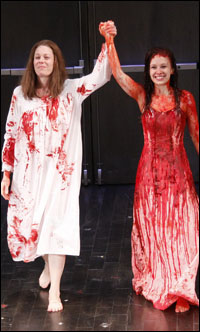 |
|
| Mazzie and Molly Ranson on opening night | ||
| photo by Joseph Marzullo/WENN |
Mazzie: It's really wonderful. The audience has been, certainly, a key element to this whole process… I think that certain people's expectations were of one thing, and so many people come to this with a preconceived notion of what Carrie should be… I think it doesn't take them very long to realize that this is an emotional journey. This is a Carrie that you're going to end up, at the end of the show, feeling something about and talking about in an emotional way. I think that we're all extremely proud of that, and that's what we wanted this to be. I think that is one of the things that people are surprised about—how emotionally involved they get in the story, and how they're seeing the story in such a different way that they never have before, and I think that's so exciting. Question: Do you think this show or this story has a message or what does it say to you? What do you think it tells people?
Mazzie: It's a fable of our time, and it's however you want to look at it — whether it's a warning or it's a cautionary tale or it's something that you watch and you think of your own behavior, how you treat other people, how you look at other people, how you judge other people, and, hopefully, you leave the theatre with maybe a different point-of-view or maybe a different sensibility.... Each theatregoer has their own experience with because, of course, everyone is their own individual and everyone has their own thoughts and their own way that they look at the world and look at other people. I think that's one of the reasons I love telling this story every night.
Question: Will there be a recording this time around?
Mazzie: I can't say a definite yes, but I'll say I'd be extremely surprised if there's not.
Question: Is there talk of a transfer or doing it elsewhere?
Mazzie: There is talk of everything right now… As an actor, you do your show, and the rest of it is out of my hands. All I know is that the audiences are building, and people are loving this show… From people that, like I said, came with a preconceived notion, and we've completely changed it, and they're like, "I've got to come back. Oh, my God. I can't believe this experience." There are a lot of people that don't know Carrie. I mean, there's a lot of young people—they don't know Carrie. They don't know the music. They weren't even alive in 1988. The movie is an older movie—the '70s. The novel is '70s. Unless their parents or someone has said, "Watch the movie," a lot of people come and don't know the story. Even people my age have come and don't know the story. It's just sort of in the theatre world that it's so [well-known]… Outside of that, it's not. [Laughs.]
Question: After Next to Normal and Carrie, are you ready for a musical comedy?
Mazzie: [Laughs.] I'm ready to do something a little lighter where maybe I don't have to be insane and cry every night. [Laughs.] Yes, that would be nice!
[Tickets for Carrie begin at $89. Visit mcctheater.org. The Lucille Lortel Theatre is located at 121 Christopher Street.]
Well, that's all for now. Happy diva-watching! E-mail questions or comments to [email protected].










